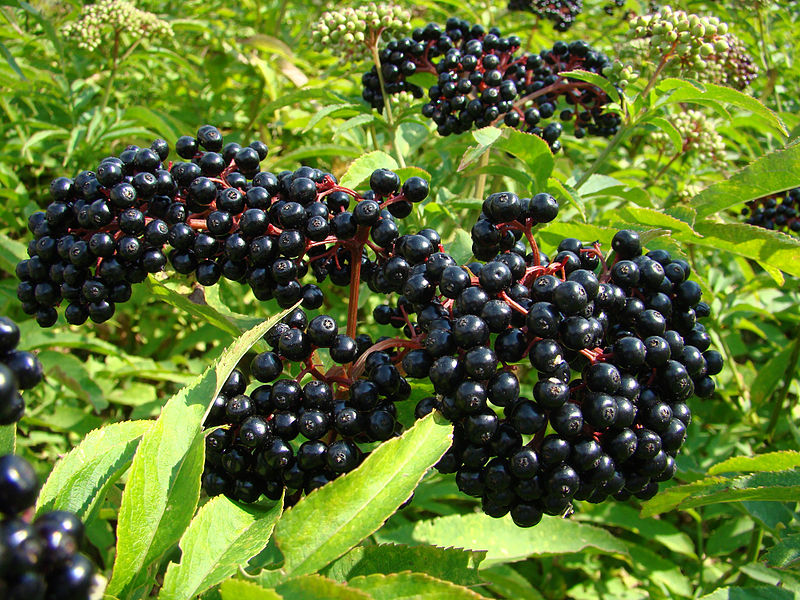
How Elderberry Can Help Relieve Cold Symptoms
Posted by Janice Long on 2022-12-28
If you're looking for a way to relieve cold symptoms, consider several natural remedies. One of these is the elderberry, which is packed with antioxidants and anti-inflammatory benefits. Read on to find out more about the history of the plant, as well as the benefits it offers.
Common uses of elderberry
The plant elderberry has been a natural cure for colds, flu, and other conditions for centuries. In addition, its dark purple fruit and flowers have been studied for their antioxidant and antimicrobial properties.
Known as the king of colds in Ayurveda, elderberry has been used for thousands of years to treat fevers and other illnesses. Elderberry is now available in supplements, syrups, and oral rinses.
Elderberry is a rich source of antioxidants, vitamin C, and potassium. However, a lot more research is needed to determine whether this supplement works.
In 2004, researchers found that elderberry syrup reduced the duration of influenza and sinusitis symptoms in most participants. Researchers also studied the effects of elderberry on inflammatory markers and the immune system.
More recent studies have shown that elderberry can boost immune health and may even prevent upper respiratory infections. But unfortunately, these studies have been mixed.
While elderberry is undoubtedly the name of the game in the fight against flu and colds, it is still a long way from being a perfect solution. As with any medication, please consult your healthcare provider before consuming it.
Antioxidant and anti-inflammatory benefits
Elderberry is a nutrient-rich berry that can help with a number of health problems. This includes reducing inflammation, stabilizing insulin sensitivity, and aiding recovery from other illnesses.
However, the benefits of elderberry can only be seen in some cases. If you have a severe illness, talk to your physician before adding elderberry to your treatment.
Although a recent study indicates that elderberry can reduce the duration of a cold and alleviate symptoms, more research is needed to determine its long-term benefits. It's also important to note that elderberry may not prevent colds.
The study was sponsored by Iprona AG, an Italian pharmaceutical company. Researchers conducted a clinical trial to investigate whether elderberry can help relieve cold symptoms. A total of 312 participants participated. They were randomly assigned to either a placebo group or an elderberry group.
Participants were asked to fill out surveys before, during, and after travel. These included the Perceived Stress Scale (PSS), which is a psychological measure of how stressed an individual is.
The long history of use for colds and flu
Elderberry has long been used as a folk remedy for colds and flu. In medieval Europe, it was believed to promote longevity and health. Despite the lack of scientific evidence to support these claims, many people swear by its healing properties.
It is possible that elderberry can reduce the length and severity of the flu, but more research is needed. There are also questions about how much it is necessary and whether it interacts with other medications.
A study conducted in 2004 found that taking elderberry extract four days before developing a cold reduced the duration of the cold. However, the study needed to be more extensive by its sample size.
Another study conducted in 2009 confirmed that elderberry has a protective effect against flu bacteria. Researchers also found that elderberry may be beneficial for treating chronic fatigue.
More recent studies suggest that elderberry may be a natural remedy for flu and cold symptoms. Some studies have indicated that it can ease the symptoms of the common cold and flu, although more research is required to verify its effectiveness.
Effectiveness against COVID-19
The elderberry has long been used to cure colds and flu. It has been found to have anti-inflammatory effects as well as an ability to boost the immune system.
Elderberry is a flowering plant that grows throughout the world. The Sambucus nigra tree is native to Asia and North America.
Elderberries are rich in cyanidin-3-glucoside, a dietary anthocyanin. This compound is thought to bind to the influenza virus envelope and inhibit its virulence.
In a 2011 study, the liquid extract from elderberries showed significant antimicrobial activity. Researchers also found that it could suppress the growth of influenza A and B viruses.
Some researchers believe that the elderberry might increase cytokines, which are chemicals produced by the immune system. These cytokines are responsible for inflammatory responses that may cause cell death. In addition, increased cytokine production may contribute to a cytokine storm, a hyperinflammation associated with severe COVID-19.
Whether or not elderberry will help the current COVID-19 pandemic remains unknown. However, more research is needed to determine how the fruit may be helpful to patients with COVID-19.